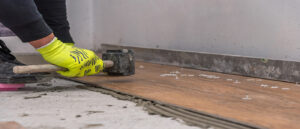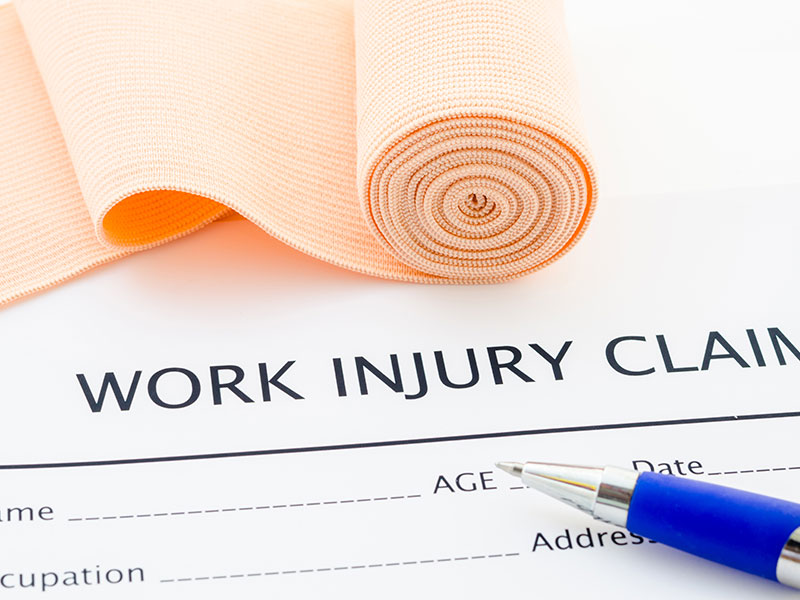The flooring industry in Birmingham, Alabama, serves as a cornerstone in the construction and home improvement sectors. Offering a wide range of services, from installation to repair and maintenance, the industry significantly contributes to our local economy.
However, this profession also comes with its own set of challenges. Whether it’s heavy lifting, exposure to chemicals, or repetitive tasks, the demands of the job can leave these workers at an increased risk of certain injuries and occupational diseases.
If you’ve been injured as a flooring installer in Alabama, it’s crucial that you understand your right to workers’ comp benefits and the steps to take after an injury. This article will help you begin the process of filing a claim so you can get the compensation you need to cover medical bills and time off work while you recover.
Study shows flooring installers have an increased risk of injuries
Is installing flooring hard on your body?
The answer to that question is a resounding yes.
In fact, according to a study published in the National Library of Medicine, flooring installers had more than double the rate of work-related musculoskeletal injuries leading to time off work, a rate of around 87 injuries for every 10,000 workers compared to only 42 injuries for every 10,000 private industry workers between 2003 and 2007.
The study also estimates that more than 90% of flooring installers are exposed to at least 1 occupational hazard or condition that increases their injury risk.
Why do flooring installers have such a high risk of injuries compared to other workers?
Flooring installers face a unique set of risks and challenges that contribute to a higher incidence of workplace injuries compared to workers in other industries.
Here are just some of the reasons why:
- Physical strain. Flooring installation requires bending, kneeling and lifting for extended periods, which can cause musculoskeletal issues over time.
- Heavy materials. Installers frequently have to lift and carry heavy rolls of carpet, tiles and planks, which can lead to back strains and other injuries.
- Use of tools. The job involves using a variety of tools like knives, nail guns and power saws, which carry the risk of cuts, punctures and other acute injuries if not handled carefully.
- Electrical risks. The use of electric tools and potential exposure to open wiring can carry risks of electric shock.
- Chemical exposure. Adhesives, sealants and other chemicals used in the process of installing floors can be hazardous if proper safety measures aren’t followed, potentially leading to respiratory issues or skin irritations.
- Repetitive movements. Tasks such as cutting, measuring and laying down flooring materials involve repetitive motions, which can lead to repetitive stress injuries.
- Time pressure. The need to complete jobs within tight schedules can sometimes encourage shortcuts in safety measures, increasing the risk of accidents.
- Lack of training. In some cases, workers may not have adequate training in safety procedures or equipment handling, exacerbating the risks.
- Environmental factors. Working in confined spaces or poorly ventilated areas can also contribute to health risks.
- Slip-and-fall hazards. The nature of the job often involves working in conditions where floors are uneven or slippery, increasing the risk of slips, trips and falls.
Because of these multiple factors, flooring installers are at a notably higher risk for workplace injuries, making safety training and workers’ compensation coverage particularly crucial in this industry.
What are the most common flooring installer injuries?
Flooring installers are susceptible to a range of injuries given the physically demanding and sometimes hazardous nature of their work. Here are some of the most common types of injuries they may experience:
- Knee injuries. Extended periods of kneeling can cause knee issues such as bursitis or meniscus tears.
- Back and spine injuries. Lifting heavy materials and working in awkward positions can lead to back strains, herniated discs and other spine-related injuries.
- Repetitive stress injuries. The repetitive motions required for cutting and placing flooring materials can result in conditions like carpal tunnel syndrome and tendonitis.
- Slip-and-fall injuries. Uneven or slippery surfaces can cause slips, trips and falls, resulting in sprains, fractures, traumatic brain injuries and spinal cord injuries.
- Respiratory issues. Exposure to dust, fumes or toxic chemicals like adhesives can lead to respiratory problems, including asthma, cancer and other lung conditions.
- Eye injuries. Debris or splinters can get into the eyes, causing injuries that range from minor irritations to severe trauma.
- Hearing loss. Consistent exposure to loud machinery without adequate hearing protection or certain chemicals can lead to hearing loss over time.
- Electrical injuries. Mishandling of electrical tools or working near live wires can result in electrical shocks, burns, internal organ damage, and even death.
- Cuts and abrasions. Handling tools like knives and saws without proper care can lead to cuts, abrasions, and, in severe cases, amputations.
- Chemical burns. Contact with strong adhesives or sealants without appropriate protective gear can cause skin irritation or chemical burns.
Pre-Existing Injury Defense in Alabama Workers’ Comp Claims
Learn how employers often use pre-existing conditions to deny workers’ comp claims and the legal routes to combat such defenses in Alabama.
How do I know if I qualify for workers’ comp benefits after a flooring injury in Alabama?
In Alabama, most employers with 5 or more employees are required to provide workers’ compensation insurance. This insurance provides eligible employees with certain benefits in the event of an on-the-job injury, illness or disease.
To be eligible for these benefits, the injury, illness or disease you sustain must occur within the context of your employment; in other words, it should happen while you’re performing tasks that are part of your job description or as a result of your work environment.
What if I caused the accident that led to my injury?
In Alabama, workers’ compensation operates on a no-fault basis, meaning you can typically qualify for benefits even if the accident that led to your injury was your fault. This no-fault system is designed to provide swift assistance to injured workers without requiring a lengthy process to determine who is at fault for an accident.
However, there are some exceptions to this no-fault rule. For instance, you won’t be eligible for benefits if your injury occurred because you were intoxicated or engaging in willful misconduct at the time of the accident.
So, even if you were responsible for the accident while performing flooring installation tasks, as long as it wasn’t due to gross negligence on your part, like being under the influence of drugs or alcohol, you should generally still be eligible for workers’ compensation benefits.
Who is exempt from workers’ comp in Alabama?
In Alabama, certain categories of employers are not required to provide workers’ compensation insurance for their employees. Those who are exempt from workers’ comp include the following:
- Employers engaged in the construction of single-family, detached homes
- Employers who hire domestic workers like housekeepers
- Employers in the agricultural sector who employ farm laborers
- Employers who have casual employees, defined as temporary workers performing tasks that aren’t part of the company’s core operations
When considering the flooring industry, installers who work on single-family, detached residential projects may potentially fall under the first exemption. This means that if you’re a flooring installer specializing in these types of homes, your employer might not be required to carry workers’ compensation coverage for you.
Likewise, if you’re hired on a temporary basis for a job that is not a part of the employer’s regular business, you may also be exempt from workers’ compensation under the casual employee category.
Because of these exemptions, it’s crucial for flooring installers to understand their employment status and the nature of their work projects to determine whether they’re covered under workers’ compensation in Alabama.
If you find that you are exempt, you may still have other legal options for recovering compensation if you can prove that your employer or another party was responsible for your accident or injuries. An experienced personal injury attorney can review your case and help protect your rights.
What benefits are eligible flooring installers entitled to after an injury?
Eligible Alabama employees are entitled to the following types of workers’ compensation benefits:
- Medical benefits. These cover all necessary medical treatment and supplies related to your injury.
- Wage loss benefits. These cover a portion of your lost wages (which typically amount to two-thirds of your average weekly wage) if you are unable to work or can only work at a reduced capacity during recovery.
- Death benefits. These are provided to certain dependents if you die from a work-related accident or injury.
It’s important to note that the types and amount of compensation you can receive depend on the severity of your injury, illness or disease, so it’s always a good idea to consult with an experienced work injury attorney for help determining how much your claim should be worth before accepting a settlement offer.
What steps should I take after a work injury in Alabama to get workers’ comp benefits?
In Alabama, you must take certain steps after a work-related injury or illness to get workers’ comp benefits. Here’s a step-by-step guide to securing compensation after an injury:
- Seek immediate medical attention. The first step is to seek medical care immediately after the injury. Even if you feel fine initially, it’s crucial to have a medical evaluation to document any potential injuries. This will not only ensure proper treatment but also serve as evidence to link your injury to your work.
- Report the injury in writing. Inform your supervisor or manager about the injury in writing within 5 days. While they may already know, providing a written notice will eliminate any potential misunderstandings. Failure to report within 90 days could result in your claim being denied, unless you were physically or mentally incapable of doing so.
- Ensure a “First Report of Injury” is filed. After you’ve reported the injury, your employer is obligated to file a First Report of Injury form. This form includes details about the incident and your wages. Make sure that your employer files this form to keep the claim process moving forward.
- Consult an attorney. If you encounter issues with your claim or it gets denied, consider hiring a qualified workers’ compensation attorney. They can assist you in navigating the legal intricacies and ensure that your rights are protected.
By following these steps, you’ll improve your chances of successfully claiming workers’ compensation benefits in Alabama.
Why You Should Hire an Alabama Workers’ Compensation Attorney
Learn when it is and isn’t necessary to hire an attorney after a work injury.
FAQs
How soon should I seek medical attention after a flooring installation injury?
You should seek medical attention as soon as possible after sustaining an injury during flooring installation work. Immediate medical care is essential for treating your injury effectively and for documenting the extent of your injuries, which will be crucial when filing a workers’ compensation claim.
Delaying medical treatment could not only worsen your condition but could also make it more challenging to establish a link between your injury and your job, potentially affecting your compensation eligibility.
What happens if I miss the 5-day deadline to report my injury?
If you miss the 5-day deadline to report your injury to your supervisor or manager, it’s crucial to provide notice as soon as you can. Failing to report within the stipulated time frame can lead to complications and delays in processing your workers’ compensation claim.
If you wait more than 90 days to report the injury, your claim will be automatically denied, unless you were physically or mentally unable to report it within that period. It’s always better to report an injury promptly to avoid any potential issues with your claim.
Can I get compensation for long-term effects or complications from a work injury?
Yes, you can potentially receive compensation for long-term effects or complications resulting from a work-related injury in Alabama. Workers’ compensation benefits cover not only immediate medical expenses but also ongoing treatment, rehabilitation and even disability payments for long-term or permanent impairments.
The specifics of what you may be entitled to can vary, so it’s essential to consult with an experienced workers’ compensation attorney to discuss the details of your case so you can understand the full range of benefits you could be eligible for.
Do I need an attorney to file a workers’ comp claim in Alabama?
While you’re not legally required to have an attorney to file a workers’ compensation claim in Alabama, having experienced legal representation can be very beneficial. An attorney can guide you through the complex claims process, ensure that all deadlines and requirements are met, and help you maximize the benefits you receive.
If your claim is denied or if there are complications such as long-term injuries, having an attorney becomes even more critical to protecting your rights and interests.
Get help from an experienced Alabama workers’ compensation attorney
If you’re a flooring installer who has been injured on the job in Alabama, you don’t have to navigate the complexities of workers’ compensation alone.
Contact the experienced work injury attorneys at Nomberg Law Firm in Birmingham today. We’ll help you secure the benefits you rightfully deserve and guide you through every step of the claim process.
Let our experienced attorneys take the burden off your shoulders so you can focus on your recovery. Reach out today for a free consultation and get the expert help you need.
References
McGaha, J., Miller, K., Descatha, A., Welch, L., Buchholz, B., Evanoff, B., & Dale, A. M. (2014). Exploring physical exposures and identifying high-risk work tasks within the floor layer trade. Applied Ergonomics, 45(4), 857–864. https://doi.org/10.1016/j.apergo.2013.11.002


